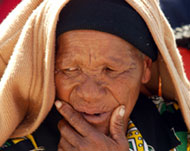Reality tempers SA women’s hopes
Thousands of women have marked the 50th anniversary of a famed anti-apartheid demonstration, but the celebrations have been soured by the reality that poverty, Aids and crime have replaced political oppression as the scourge of South Africa.

Festivities took place throughout the country on Wednesday in honour of the 20,000 women who risked the wrath of the law in 1956 by marching on government headquarters to protest against the hated pass laws, which restricted the movement of non-whites.
Sophia Williams de Bruyn, one of the organisers of the original march, said that “we regard August 9 as a celebration of victory over apartheid”.
“It was the overwhelming spirit of Africa that cried out,” she told a large crowd gathered at the Union Buildings in the capital, Pretoria.
The day of the historical march is now honoured as National Women’s Day, which is also a public holiday for all South Africans.
‘Struck a rock’
The demonstrators 50 years ago marched to give JG Strijdom, the then-prime minister, a memorandum saying that homes would be broken up and children left defenceless if women were arrested under pass laws.
Their song, “Now you have touched the women, Strijdom! You have struck a rock. You have dislodged a boulder! You will be crushed,” became an anthem for women’s movements across the country.
 |
|
Women opposed the rigid |
There have been big strides in women’s rights at the political level since the advent of democracy in 1994.
South Africa has a woman deputy president, Phumzile Mlambo-Ncguka, and 12 women in the 28-member cabinet.
But economically, much remains to be done.
An estimated 75% of black women under 30 are jobless, according to the Congress of South African Trade Unions.
In 2002 women held only 14% of top management positions – although the proportion held by black women was only 2%.
Mbeki’s remarks
Thabo Mbeki, the president, who welcomed the marchers at the Union Building, said: “The fruits of our liberation have not reached many of our women.”
He said government would step up its efforts.
“Together as a nation, we must uphold the perspective that none of us is free unless the women of our country are free. Free from racial and gender discrimination, free from poverty, free from fear and violence,” Mbeki said.
 |
|
Mbeki: Fruits of liberation have |
South Africa has the world’s highest reported rates of rape and domestic violence.
In 2004, there were 114 reported rapes per 100,000 people, compared with a rate of 32 rapes per 100,000 in the US.
A study last year by the Medical Research Council found that a woman was killed every six hours by an intimate partner in South Africa, the highest reported anywhere in the world.
Also, women have been hardest hit by the Aids virus that is ravaging South African society.
Shocking figures
More than 30% of pregnant women are infected with the HIV virus, according to official figures.
This compares with a rate of 19% for all adults.
The government has repeatedly been criticised for not doing enough to slow the rate of infections and provide treatment in the country with the highest number of people with the disease.
Adelaide Tambo, the 77-year-old widow of anti-apartheid hero Oliver Tambo, made an impassioned speech on behalf of all women of her generation, saying many were caring for their grandchildren because their children had died of Aids.